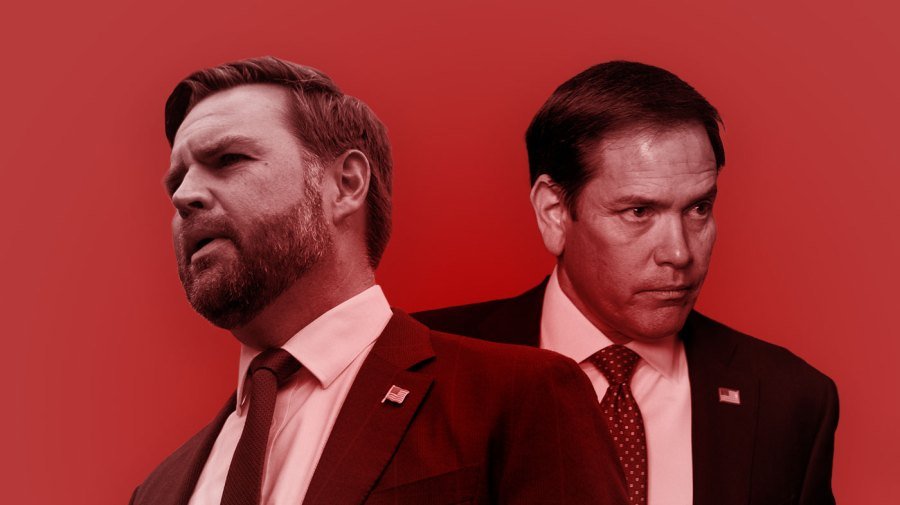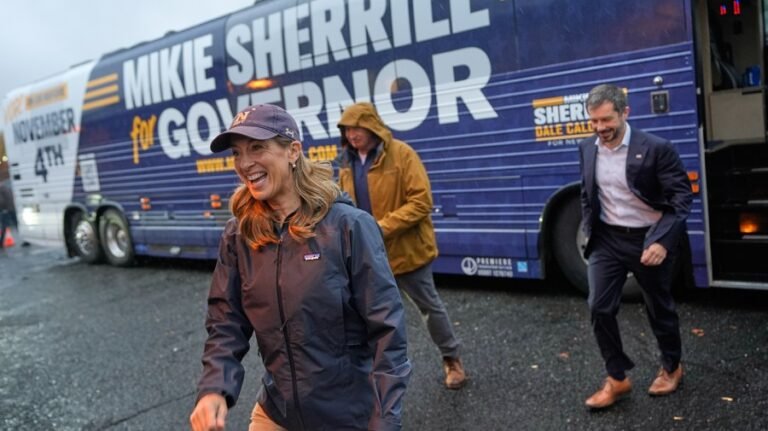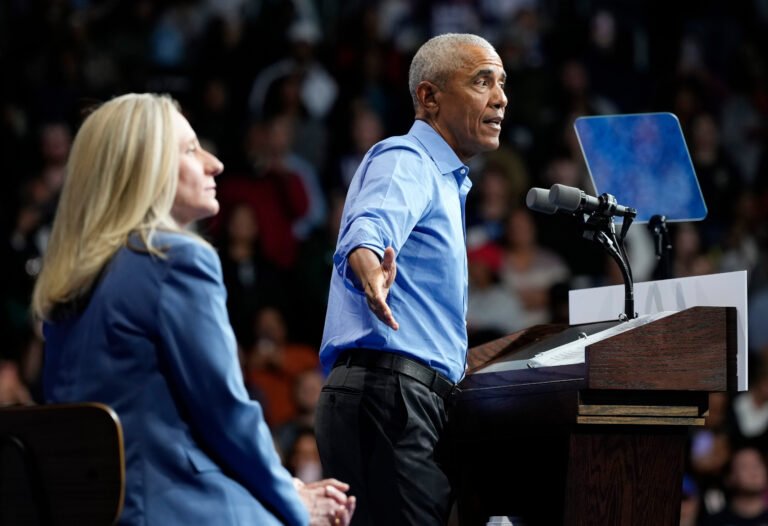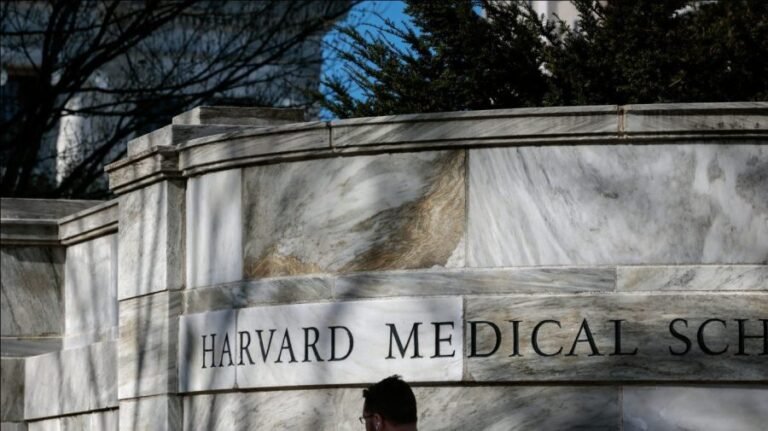
President Trump floating Vice President Vance and Secretary of State Marco Rubio as a potential presidential ticket is fueling questions about their working relationship and political futures as chatter about who will lead the 2028 Republican ticket intensifies.
Vance and Rubio have a history of teaming up during their tenures in the Senate, but talk of a Vance-Rubio ticket has left some political watchers wondering about a rivalry brewing between two figures who are gunning to be No 1.
Many Republicans, meanwhile, are excited by the prospect of the two teaming up to succeed Trump.
“Romulus and Remus here, the sons of MAGA, uniting and heading into 2028 on firm footing for the future,” mused Republican strategist Matt Bartlett.
The prospect of a potential 2028 run from the vice president seemed to be on young conservatives’ minds on Wednesday when Vance headlined a Turning Point USA event at the University of Mississippi. Vance was met with chants of “48” during his address to students.
“Let’s not get ahead of ourselves,” he responded.
Polling suggests if the 2028 primary were held today, Vance would be on solid ground. According to a University of New Hampshire poll released this week, 51 percent of likely GOP New Hampshire said they would back Vance for the nomination.
“That’s just shocking right now for a presidential primary,” Bartlett said, referring to Vance’s lead in the poll three years out from the 2028 election.
The same poll showed former UN Ambassador Nikki Haley at nine percent, followed by Director of National Intelligence Tulsi Gabbard at eight percent and Rubio at five percent.
“There’s no one more beloved other than the president right now than JD Vance,” Bartlett said. “Second would be Marco Rubio, someone who was a traditional Republican and transformed into an articulate MAGA speaker.”
Vance denied there would be any tension with Rubio in an interview on Wednesday, calling the secretary of State “his best friend in the administration.” The vice president added that any discussions about 2028 were “premature.”
“They got along in the Senate but they’ve gotten a lot closer in the Cabinet. One of the things I know he really appreciates about Marco is how diligent and team oriented he is,” a source familiar told The Hill.
Republicans argue the idea of a Vance-Rubio ticket is a “no-brainer” for the party, saying it would unite the populist wing of the party under Vance and Rubio’s more traditionalist, hawkish wing.
“They balance out all wings of the GOP, plus they are both young. They’re the next generation and they also bring different assets to the table ,” said Ford O’Connell, a Republican strategist.
Others push back on the idea that Rubio and Vance represent different GOP factions, with the source familiar calling it “bullshit.”
In the Senate, Vance and Rubio co-authored the Teamwork for Employees And Managers Act that pushed to allow employees to go around unions during negotiations with their employers. The two also signed onto a letter with Sen. Josh Hawley (R-Mo.), calling on the Biden administration to block Nippon Steel’s acquisition of U.S. Steel.
Vance and Rubio have accumulated enormous power within the White House, critical for them as they seek to position themselves as experienced leaders and take credit for the administration’s successes.
The two have most recently played leading roles in brokering and maintaining the Israel-Hamas ceasefire, as well as helping lead the Trump administration’s efforts to end Russia’s war in Ukraine.
Vance’s former national security adviser, Andrew Baker, is the co-deputy national security adviser at the slimmed-down National Security Council. But with Rubio as the acting national security adviser, he still has the ultimate say.
While Trump and Republicans suggest the duo would be a presidential dream team of sorts, there would be major challenges in forming such a ticket.
“It’s very hard to arrange a marriage in politics,” said Alex Conant, a Republican strategist and alum of Rubio’s 2016 presidential campaign. ”I think there is a fight brewing in the party between the America First crowd and the traditional conservatives. Whether that can be bridged with some sort of unity ticket or plays itself out in a primary remains to be seen.”
Rubio is no stranger to the idea of a unity ticket. The then-senator rejected an offer from Sen. Ted Cruz (R-Texas) to form a partnership to stop Trump in the 2016 presidential primary. The then-Florida senator dismissed the idea as “House of Cards stuff” during an MSNBC town hall during the primary.
Some strategists warn that Trump anointing a presidential ticket ahead of a primary contest would be perceived as undemocratic. Furthermore, political observers say it’s unlikely that Vance and Rubio would voluntarily run as vice president given their experience and ambition.
“Nobody runs to be vice president,” Conant said. “But for the president to anoint a unity ticket would be totally unprecedented in American politics, but everything about Trump is unprecedented.”
Still, vice presidents are picked strategically. Trump’s pick of then-Indiana Gov. Mike Pence in 2016 was largely viewed as the president looking to shore up the powerful white evangelical wing of the Republican Party. Vance was seen as a next generation pick in the GOP’s effort to win over younger voters.
Another factor to take into account is how serious Trump and his allies would be about seeking a third term. While the president publicly talked about the possibility of pursuing a third term this week, he has noted he is “not allowed” to run for a third term.
There are Trump allies, including former top adviser Steve Bannon, who insist there are loopholes the president can go through to run for a third term.
“If he’s not angling for some sort of third term himself, he wants to be firmly in control of the nominating process,” Conant said. “I think he is signaling that this is a decision he will make.”
Conant warned against speculating too much about the future GOP ticket, noting “we’re an eternity from 2028.”
“Speculating on who will be vice president is probably as counterproductive as speculating about who will be the nominee this far out,” he said.
Laura Kelly contributed


